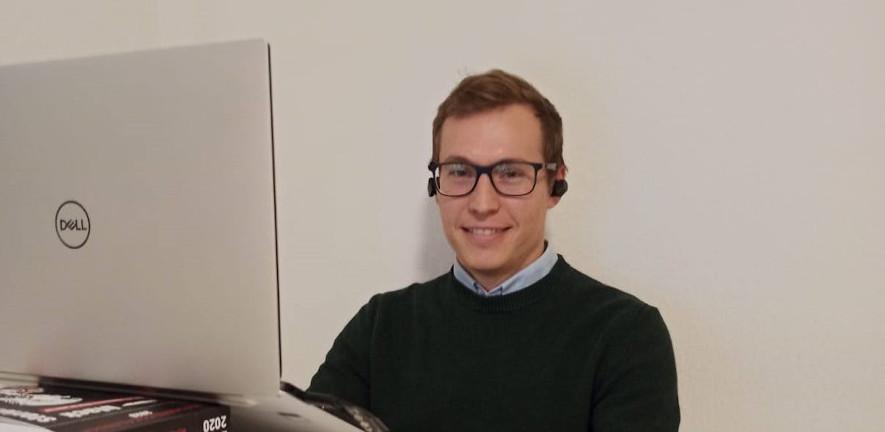
The pigments can be supplied to the coating industry, and could be used in the pharmaceutical market and eventually replace plastics.
Lukas is a member of Professor Silvia Vignolini’s Bio-Photonics group, where he has been investigating how the morphology of cellulose affects its light-scattering and optical properties.
“One of our particular projects was focusing on making white pigments through altering the chemical structure of cellulose,” says Lukas. “We realised this was a huge opportunity for the commercial side, because current alternatives for white pigments are rare. The main material used is titanium dioxide, but there have been recent concerns from governments about the safety of this material for human health.”
“The reason titanium dioxide is used is because it has a highly refractive index that is hard to reach with biopolymers,” says Lukas. “But we have developed a clever way of structuring cellulose at the nano-scale that allows us to achieve the same whiteness.”
The cellulose materials Lukas works with are intrinsically sustainable and biocompatible. “Cellulose itself is the main component in every plant cell, and it is already safely used in food products, often as a thickener,” he points out.
The technology has now been patented and Lukas says the markets are very interested in the new material. He is working actively in creating a spin-out and commercialising the research.
Lukas says that in the Vignolini group he has been able to build on his understanding of optics and photonics from his PhD in physics at the University of Zurich to research how the chemical structure of cellulose and other materials affects their light-scattering and optical properties.
When Lukas arrived in Cambridge in 2019, he took an entrepreneur course offered by the Postdoc to Innovators Network, which spurred his interest in entrepreneurship and commercialisation.
As his idea for the business grew, the business plan competition came along at a good time. To enter, Lukas had to submit a business plan outlining his idea, and as a semi-finalist he received one-to-one coaching for his first stage presentation to judges, followed by one-to-one pitch training.
“Working as a researcher you don’t realise how large the gap is between developing a technology and understanding the markets and customer needs, so I’ve been so lucky to have this support. I now have more insight and I’m more prepared on how to refine our materials,” he says.
Senior Marketing Executive of Cambridge Enterprise Rob Ince said of the Business Plan Competition: “Despite the Covid-19 pandemic, it has been another year of high calibre submissions. The applications for entry were every bit as strong in 2020 as they have been in previous years.”
Professor Andy Neely, Pro-Vice-Chancellor for Enterprise and Business Relations, said he was “blown away by the quality of the pitches, the quality of the ideas, the passion of the presenters and the potential of their innovations.”
The first prize of £20,000 went to Gita Khalili Moghaddam from Clinical Neurosciences for GlycoVue, which combines glucose-responsive smart polymers with advanced holography and AI-enabled smartphone technology for diabetes self-management. The second prize of £10,000 was awarded to Yuanbo Deng from Engingeering for REAVIS, which has invented low-cost Head-Up Display (HUD) technology that can be adapted for passenger cars, commercial trucks and urban trains. Lukas received £5,000 for Impossible Materials.
The competition is sponsored by international law firm Taylor Vinters.
To honour the late Professor Chris Abell, who passed away unexpectedly in October, it was announced at the Grand Finale on 12th November that the competition will be re-named The Chris Abell Postdoc Business Plan Competition. “In doing this, we will continue to recognise his enormous contribution to science, innovation, supporting the postdoctoral community, and ultimately contributing to society,” said Professor Neely.

